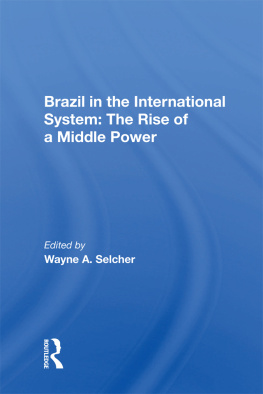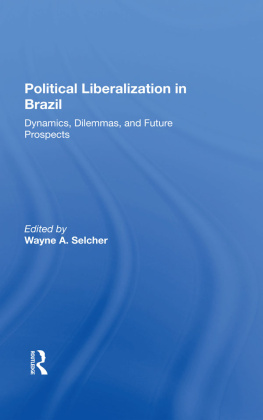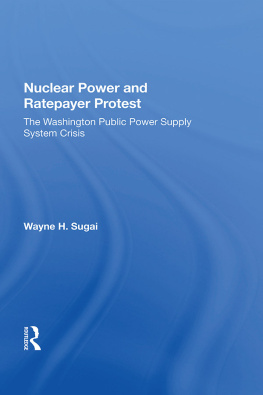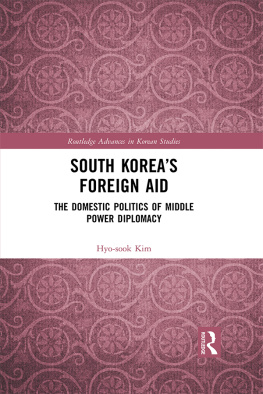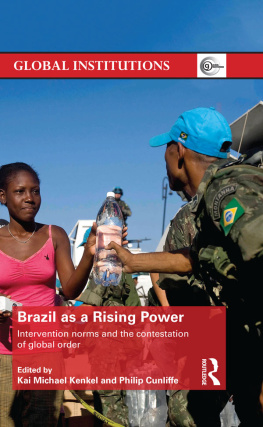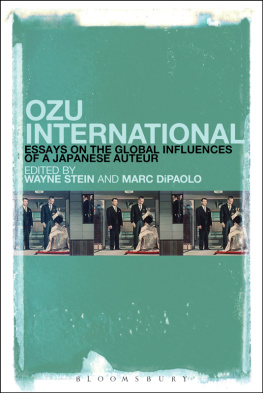Brazil in the International System
Also of Interest
Change in the International System , edited by Ole R. Holsti, Randolph M. Siverson, and Alexander L. George
Corporatism and National Development in Latin America , Howard J. Wiarda
From Dependency to Development: Strategies to Overcome Underdevelopment and Inequality , edited by Heraldo Muoz
The Future of Brazil , edited by William H. Overholt
Brazil: A Political Analysis , Peter Flynn
Technological Progress in Latin America: The Prospects for Overcoming Dependency, edited by James H. Street and Dilmus D. James
Brazil's Multilateral Relations: Between First and Third Worlds, Wayne A. Selcher
Land Reform in Brazil: The Management of Social Change, Marta Cehelsky
International Politics and the Sea: The Case of Brazil, Michael A. Morris
Latin America, the United States, and the Inter-American System, edited by John D. Martz and Lars Schoultz
The Challenge of the New International Economic Order , edited by Edwin P. Reubens
Debt and the Less Developed Countries , edited by Jonathan David Aronson
World Economic Development: 1979 and Beyond, Herman Kahn
Available in hardcover and paperback.
Westview Special Studies on Latin America and the Caribbean
Brazil in the International System:
The Rise of a Middle Power
edited by Wayne A. Selcher
In recent years, Brazil has grown greatly in international status, and all indications are that it will continue to do so. The authors of this book evaluate Brazil from a "Brazil in the world" viewpoint, placing the country in the current international system in relation to its capabilities, effects, and interest positions. On the basis of their conclusions, the authors go on to assess the extent and direction of Brazil's potential to exert international influence in the future.
Wayne A. Selcher is associate professor of political science and department chairman at Elizabethtown College. He is also a prominent writer on Brazil and, in addition to many articles and studies, has written The Afro-Asian Dimension of Brazilian Foreign Policy, 1956-1972 and Brazil's Multilateral Relations: Between First and Third Worlds (Westview Press, 1978).
Brazil in the International System: The Rise of a Middle Power
edited by Wayne A. Selcher
First published 1981 by Westview Press, Inc.
Published 2018 by Routledge
52 Vanderbilt Avenue, New York, NY 10017
2 Park Square, Milton Park, Abingdon, Oxon OX14 4RN
Routledge is an imprint of the Taylor & Francis Group, an informa business
Copyright 1981 Taylor & Francis
All rights reserved. No part of this book may be reprinted or reproduced or utilised in any form or by any electronic, mechanical, or other means, now known or hereafter invented, including photocopying and recording, or in any information storage or retrieval system, without permission in writing from the publishers.
Notice:
Product or corporate names may be trademarks or registered trademarks, and are used only for identification and explanation without intent to infringe.
Library of Congress Cataloging in Publication Data
Main entry under title:
Brazil in the international system.
(Westview special studies on Latin America and the Caribbean)
Includes index.
1. BrazilForeign economic relationsAddresses, essays, lectures. 2. Brazil
Foreign relationsAddresses, essays, lectures. I. Selcher, Wayne A., 1942- . II. Series.
HF1513.B7 337.81 81-1686
ISBN 0-89158-907-4 AACR2
ISBN 13: 978-0-367-02224-2 (hbk)
Contents
, Ronald M. Schneider
, Frank D. McCann
, Wayne A. Selcher
, Max G. Manwaring
, Martin T. Katzman
, Robert D. Bond
, Carlos J. Moneta and Rolf Wichmann
Wolf Grabendorff
, Anani Dzidzienyo and J. Michael Turner
, Michael A. Morris
Ronald M. Schneider
Is Brazil now or is it soon to become a major power? What is the degree of correspondence between this continent-sized country's aspirations and its capabilities in the international sphere? No clear consensus has yet developed on these and related questions, but their relevance has become increasingly evident as Brazil's upward mobility within the international system has been dramatic over the past decade and little less than breathtaking over the past twenty years. In this first edited collection of essays on Brazil's foreign relations, Wayne Selcher and his associates comparatively examine the position of Brazil in the global international system and the significance of its particular location, determining whether or not it is unique and examining changes that may be taking place, the effects of these changes on other countries, and methods for determining the answers to such questions. Drawing upon the literature of international politics, they systematically place Brazil within the structure of international affairs with respect to capabilities, effects, interests, and status. Particular care is given to distinctions between middle powers and major powers and to Brazil's place among the so-called new influentials.
Serious attention to Brazil's current foreign relations in the general literature of international relations is a very recent development, dating at best to the late 1970s. Prior to that time scant attention was paid even by Latinamericanists to this subject, with very little research done and that chiefly by doctoral candidates. H. Jon Rosenbaum began to publish a series of articles at the end of the 1960s, and Roger Fontaine completed a Ph.D. dissertation on "The Foreign Policymaking Process in Brazil" at Johns Hopkins University in 1970. This was followed by Keith Larry Storrs's "Brazil's Independent Foreign Policy, 1961-1964" (Ph.D. dissertation, Cornell University, 1973). By this time Wayne Selcher had also completed a dissertation, subsequently published as The Afro-Asian Dimension of Brazilian Foreign Policy, 1956-1972 (Gainesville: University of Florida Press, 1974). In 1972 the Foreign Policy Research Institute (FPRI) in Philadelphia developed an interest in this subject and started several young scholars working along with such relatively old hands as myself and Wayne Selcher. Perhaps more important than the FPRI's two-volume mimeographed report Brazil's Future Role in International Politics (June 1973)was the fact that two of these young scholars, Michael Morris and William Perry, would continue their research along this line into their subsequent academic careers.
The thesis that Brazil was a potential major power or even a candidate for eventual great power status was launched at the August 1973 World Congress of Political Science by Norman A. Bailey and me in a paper on "Brazil's Foreign Policy: A Case Study in Upward Mobility," subsequently published in the spring 1974 issue of Inter-American Economic Affairs (Vol. 27, pp. 3-25). This was followed shortly by David M. Landry's "Brazil's New Regional and Global Roles" ( World Affairs, Vol. 137, Summer 1974, pp. 23-37) and Riordan Roett's article on "Brazil Ascendant: International Relations and Geopolitics in the Late 20th Century" ( Journal of International Affairs , Vol. 29, 1975, pp. 139-154). Other aspects of Brazil's international relations were explored in Fontaine's Brazil and the United States: Toward a Maturing Relationship (Washington, D.C.: American Enterprise Institute for Public Policy Research, 1974); Brady Tyson's essay in Harold E. Davis and Larman Wilson (eds.), Latin American Foreign Policies (Baltimore, Md.: Johns Hopkins University Press, 1975); and Perry's "Contemporary Brazilian Foreign Policy: The International Strategy of an Emerging Power," Foreign Policy Papers, Vol. 2, no. 6 (Beverly Hills, Calif.: Sage Publications, 1976).


